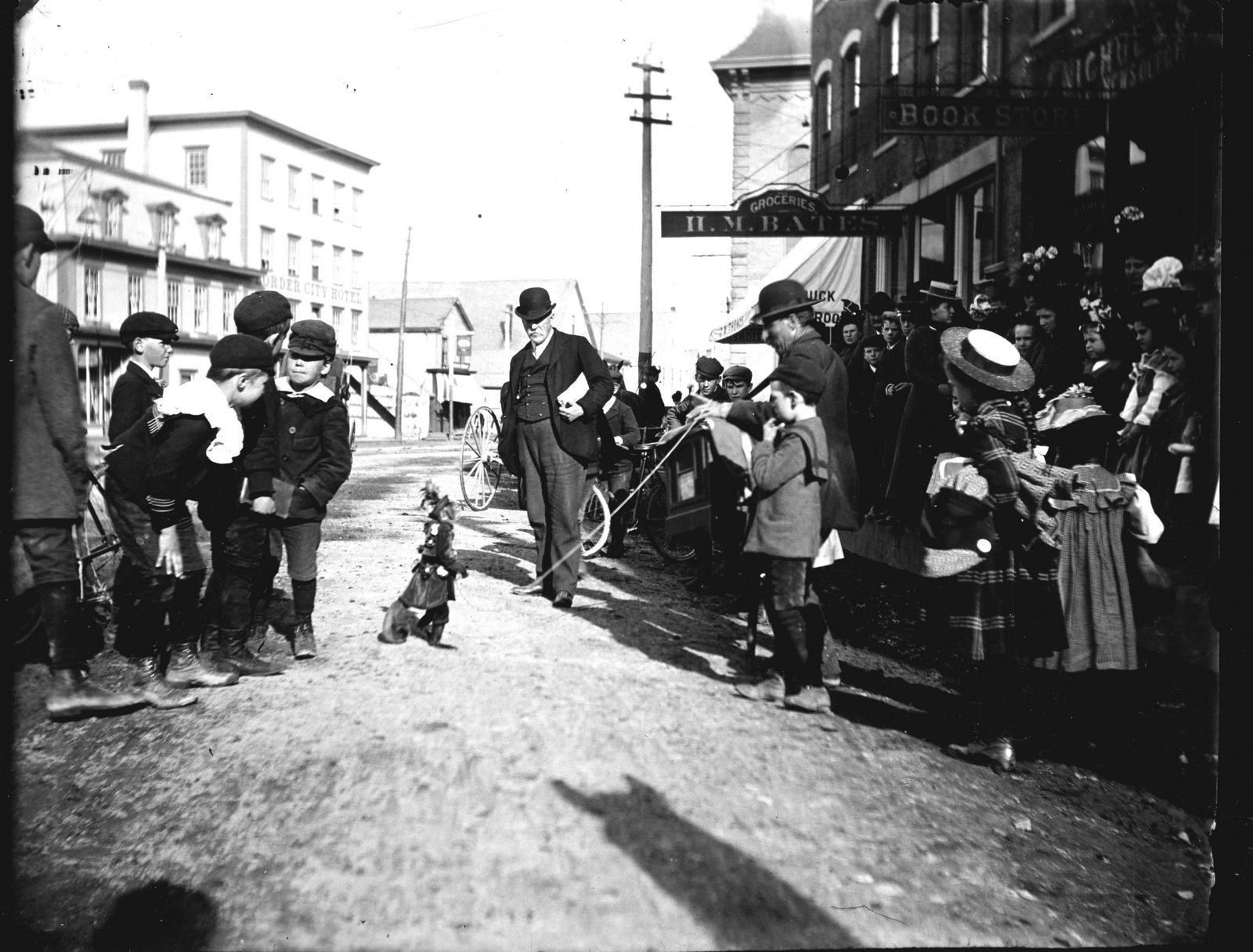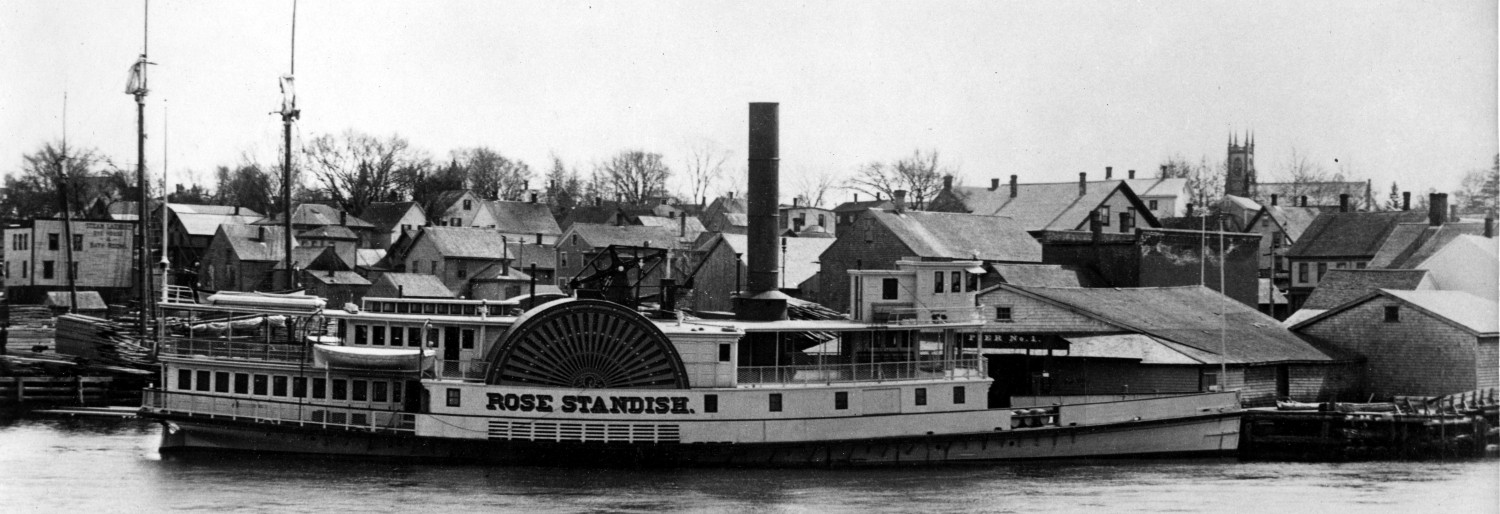In 1896 the world’s imperialists continued to squabble over the few remaining African nations not yet under the thumb of one European nation or another. One of the few not yet totally subjugated was Ethiopia which, for reasons still unclear to this day, was coveted by Italy. At the battle of Adwa the Ethiopians defeated an Italian force of 20,000, nearly annihilating the Italians.
In our hemisphere U.S. Marines landed in force in Nicaragua to “protect U.S. citizens.” In truth the U.S. citizen in need of protection was the U.S. corporation United Fruit. As our Supreme Court has recently ruled that corporations are people, the rationale for the invasion was, at least retroactively, not a complete fiction.
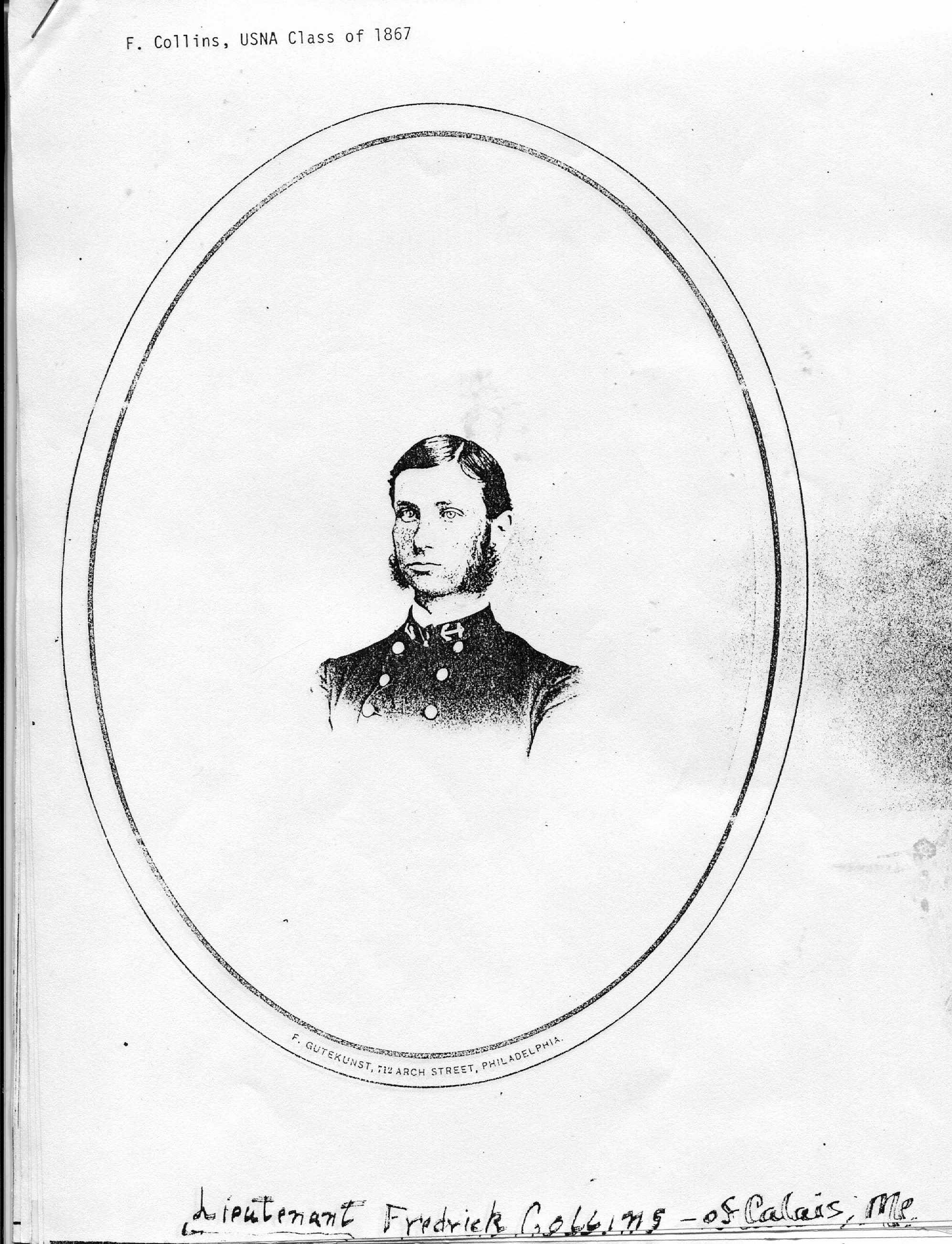
Fred Collins of Calais, explored the Nicaragua canal route
Calais in fact had a close connection with Nicaragua in the person of Lt. Frederick Collins who grew up on the corner of Temperance and Germain streets. He attended the Naval Academy and was sent to Nicaragua to survey a possible route through the country for the Transoceanic Canal linking the Atlantic and Pacific. He became a strong but unsuccessful advocate for the “Nicaragua Route” rather than the route through Panama. Collins died young primarily as a result of the many tropical diseases he contracted in the jungles of Nicaragua and is buried at the Naval Academy.
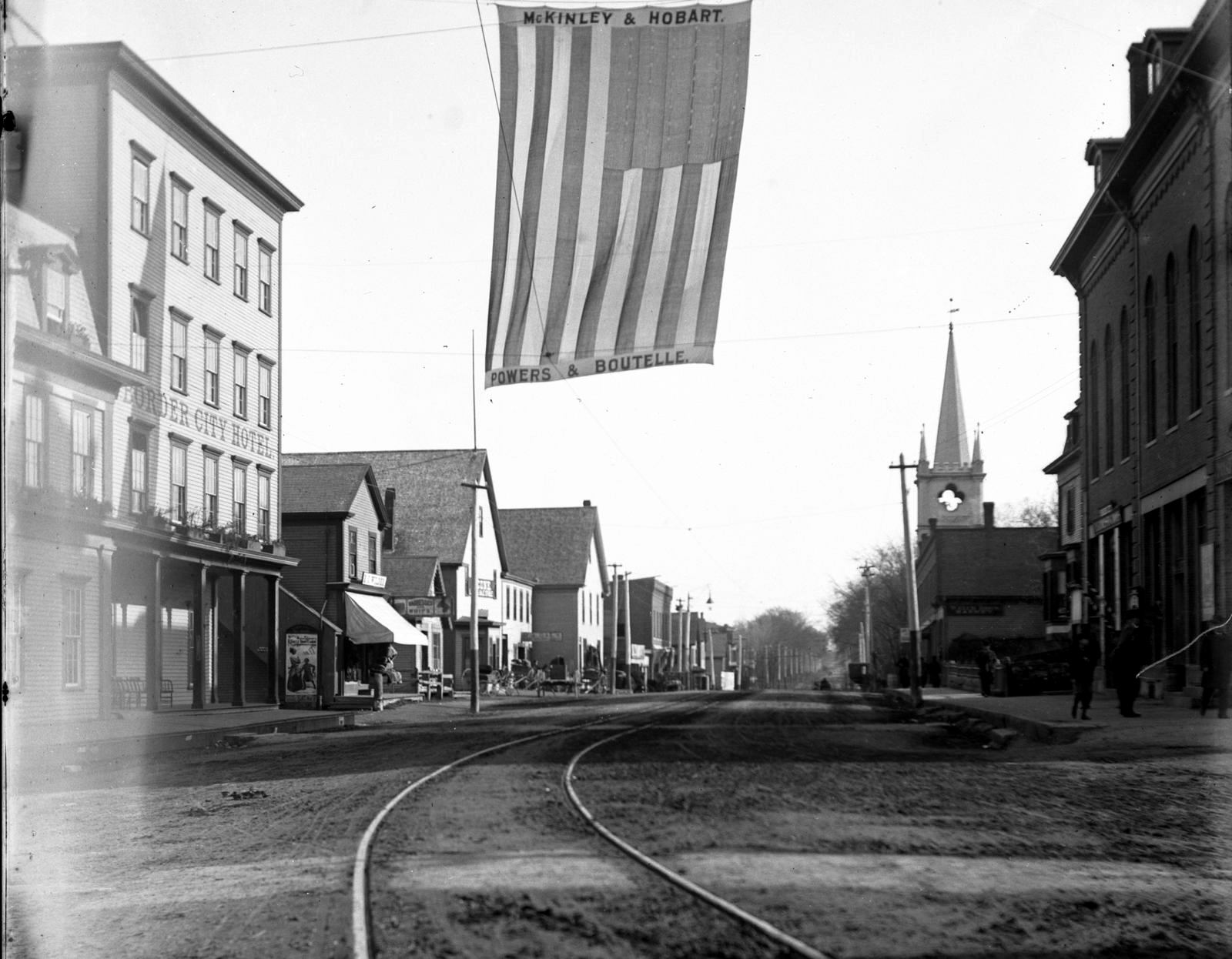
Main Street Calais 1896 Election Flag
1896 was a presidential election year as is apparent from this 1896 photo of Main Street Calais. The building to the right is the Opera House, more recently the JD Thomas building, the church steeple belonged to the Methodist Church, now the parking lot of the food pantry and the Border City Hotel was demolished in about 1940 and a gas station built which for many years was owned by the Thomas and Gordon families. McKinley won. His Vice President, Hobart, was a very powerful and popular senator from New Jersey who exerted nearly as much influence over public policy during McKinley’s presidency as McKinley himself. He would have certainly been on the ballot in 1900 with McKinley had he not died in 1899 of a heart condition. He was not replaced as Vice President and in 1900 McKinley selected Teddy Roosevelt as his running mate. McKinley won a second term but was assassinated in 1901 and the Presidency passed to Teddy, one of the most dynamic and controversial men ever to hold the office. The hoarding just to the right of the Border City advertises a production of Uncle Tom’s Cabin at the Opera House.
In other national news Utah became a state and elected the 1st woman to serve in the U.S. Senate. Gold was discovered in Alaska and, more significantly, the X-Ray was discovered by Roentgen. The first movie theater opened as did the Dow Jones with a total of 12 stocks on the board; it closed at $40.94 the first day. Henry Ford drove his first automobile down Main Street in Detroit and the first reported auto theft occurred. The Tootsie Roll hit the market.
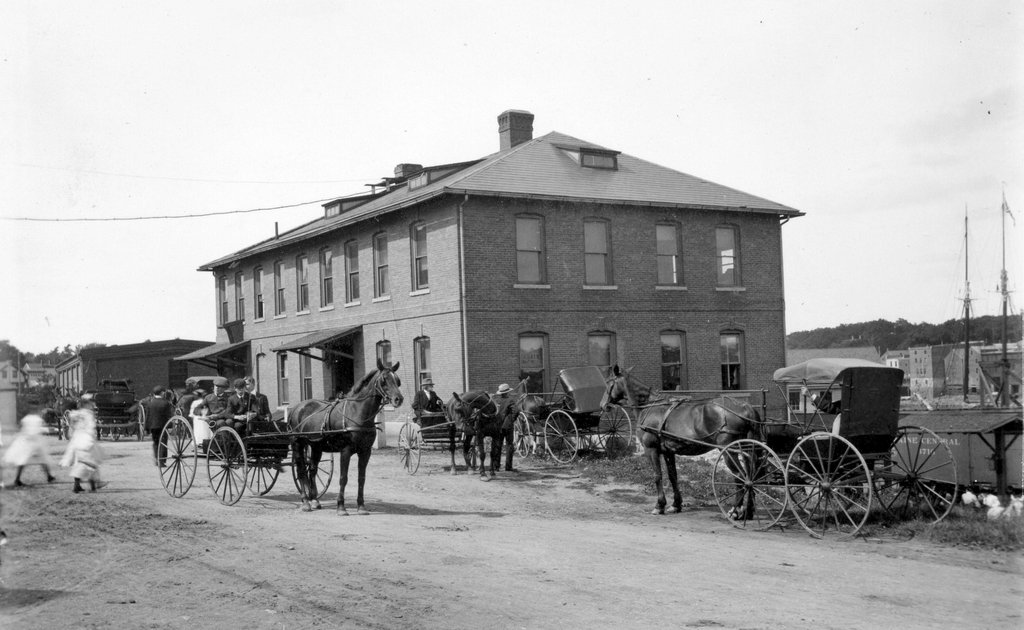
The railroad station on Hog Alley
One of fiercest political and economic battles ever waged in the St Croix Valley occurred in 1896 over the railroad extension from Ellsworth to Downeast Maine. Everyone was enthusiastic about the extension, but the route became extremely contentious. Originally planned to run to Calais and then down the coast to Eastport through Robbinston, a last-minute change eliminated the “coastal route” and instead the organizers proposed building a spur line from Ayers Junction to Eastport, bypassing Robbinston. Calais was furious because it would have no direct connection with Eastport and Robbinston was even angrier because it would have no railroad at all. This change was devastating for Robbinston’s economic prospects. Thousands of gallons of ink were spilled over the pages of newspapers, protests organized and friendships sundered but to no avail. Little did the railroad interests suspect that inventors tinkering with the “horseless carriage” would by 1899 begin transforming transportation.
Calais had 13 schools in 1896, and the Fire Department finally convinced the City Council to put fire alarm boxes on street corners around town. There were several suicides and murders in the area and the river claimed its usual share of victims. In January the Portland Express Herald reported that:
The body of Mrs. McLean of St. Stephen was today taken from a cake of ice floating down the river. It is supposed she fell from the wharf to the ice and being unconscious from the blow was frozen to death. Her home was on the river front at St. Stephen, which is thought to bear out this theory. There were no marks of violence on the body.
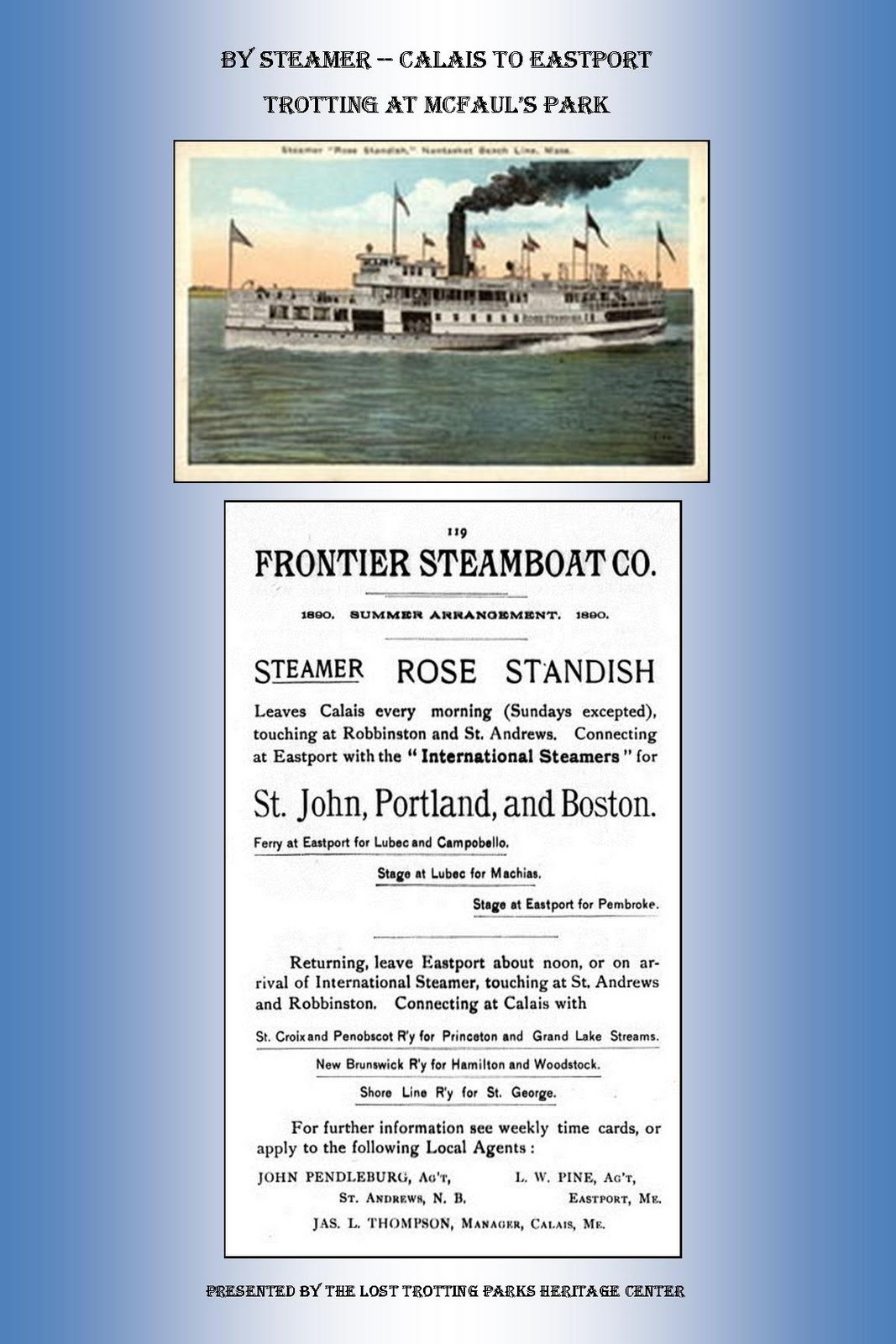
Excursions on the Rose Standish to special events were a summer tradition
Then there was the sad fate of Captain David Melville of St. Stephen, a veteran of the Civil War, sea captain and “prominent citizen of St. Stephen”. Captain Melville was in a group on a down river excursion to St. Andrews on the steam launch Annie and was “seen at times greatly enjoying himself.” When the Annie was nearly back to the St. Stephen wharf his absence was finally noticed by the other partiers and the next day his body washed ashore downriver. There is a cultural aspect to the captain’s death. Excursion in steamships downriver from Calais and St. Stephen to St. Andrews and Eastport were often pretty wild affairs, the liquor flowed much faster than the river on most such excursions, especially when Calais folks were on board as Prohibition was the law in Maine. No doubt Captain Melville had fallen overboard after enjoying himself a bit too much. Henry Eaton of Calais, a teetotaler and rigid churchman, demanded his name be removed from the steamship Henry Eaton because of the riotous and, according to Henry, immoral behavior of the passengers on these downriver excursions.
Murder was much in the news in the St. Croix Valley in 1896.
In early September the jail at Calais was occupied by a fugitive who was attempting to escape a double murder in Moncton. John Sullivan was a local man who had lived for many years in Milltown and worked in the sawmills. His penchant for violence was well known in the area. While living in Milltown he fired a shot that barely missed Fanny Cameron but claimed it was an accident. He was also said to be the murderer of a Milltown man named Ephraim Scott although the case could not be proved. Moving to Moncton he was forced to flee when he became the primary suspect in the murders of Eliza and Harris Dutcher and the attempted murder of their little daughter. He hid out with relatives in Cooper under the assumed name of Frank McDonald but not wanting to miss important correspondence, he told his acquaintances in Moncton to send his mail to the Milltown Post Office addressed to Frank McDonald. It was a fatal error. The authorities simply waited for someone to pick up his mail and when a farmer from Cooper arrived to do so, he divulged Sullivan’s whereabouts. A “posse of policemen” from Calais accompanied the farmer to Cooper where Sullivan was arrested.
In May 1896 a fellow from Houlton named Young Adams got into a row in St. Stephen with a local boy over “a Salvation Army lass” and killed him. The Portland Press said the folks in Houlton were very concerned as “the Queen’s cases are vigorously prosecuted there and there is much alarm among Adam’s friends in this place. New Brunswick still has the gallows for murderers. The young man is now in the St. Andrews jail awaiting trial.” Maine had abolished capital punishment in the 1880’s.

Natives at St Andrews, the three Passamaquoddy men were probably visiting them
A third 1896 murder attracted national attention and but for luck three young Passamaquoddy men would likely have spent a good part of their lives in Thomaston State prison. The deceased was a St Andrews businessman named Michael McMonagle who hired three Passamaquoddy men to take him across the bay in their canoe to Pleasant Point. Approaching the Maine shore witnesses claimed the natives attacked McMonagle, struck him several times in the head with a paddle, took his money and threw him overboard. When he didn’t immediately sink, he was struck again with the paddle.
Portland Press Herald September 21, 1896
Men Becalmed in a Yacht Watched the Indians Kill McMonagle.
Calais, Me Sept. 19, 1896
Regarding the death of Michael McMonagle, Wednesday, Freeman Cox and Dennis Harrington, belonging to this city say that were becalmed in a yacht off Gleason’s Cove, near Perry, Maine, and saw the Indians kill McMonagle, Wednesday afternoon. On account of the strong tide and the absence of wind and having but one oar, they were unable to reach the canoe where the murder was committed. The authorities at St. Andrews, N.B. have arrested three Indians named Lola T. Lola, John Stevens and Wallace Nicholas on suspicion. Sebatis Tomah who was arrested at Peter Point last night was brought to this city this morning. A vigorous search is being made for body but has thus far been unsuccessful.
September 22, 1896, Portland Daily Press:
Particulars of the Death of Michael McMonagle at St. Andrews.
Great Interest In the alleged murder of Michael McMonagle of St. Andrews, continues in Calais and surrounding towns.
Later reports furnish a more complete story of the affair than has been given. McMonagle had hired three Indians, one named Lola, a second named Sabattus Thomas and a third whose name has not been learned, to take him to Pleasant Point, the home of the Passamaquoddy tribe of Indians.
The party started from St, Andrews and seemed to get along all right until the Perry shore, when several people who were on shore heard loud talk coming from the direction where the canoe was drifting along, and it is claimed that Lola was seen to raise his paddle and strike McMonagle over the head. The men on the shore say heard him cry for mercy and heard the other Indians say, “Lola, don’t do that” to which Lola replied, let go my paddle and struck his victim again.
Then, as the witnesses claim, he picked up the then unconscious man and threw him overboard and in doing so, the canoe was upset, precipitating its occupants into the water.
Lola called for the other Indians to assist him in righting the canoe and all then managed to get the craft right side up and get into it.
By this time McMonagle, who had been revived somewhat by the cold water, called to the Indians to save him and endeavored to reach the canoe when, it is reported, Lola hit him with the paddle and he immediately sank from view.
The defendant vehemently protested their arrest and proclaimed their innocence. They said the canoe had capsized when a paddle broke. In fact, the evidence in this case was pretty thin as two of the accusing witnesses were drunk and others who were sober, testified the canoe overturned when the paddle broke and upset the rhythm of the paddlers. The conflicting accounts raised a serious question regarding the guilt of the three Passamaquoddies but times being what they were, the natives were locked up in the Machias jail and bound over for trial. Had the body been taken out to sea by the tide and not recovered the three natives would likely have been convicted.
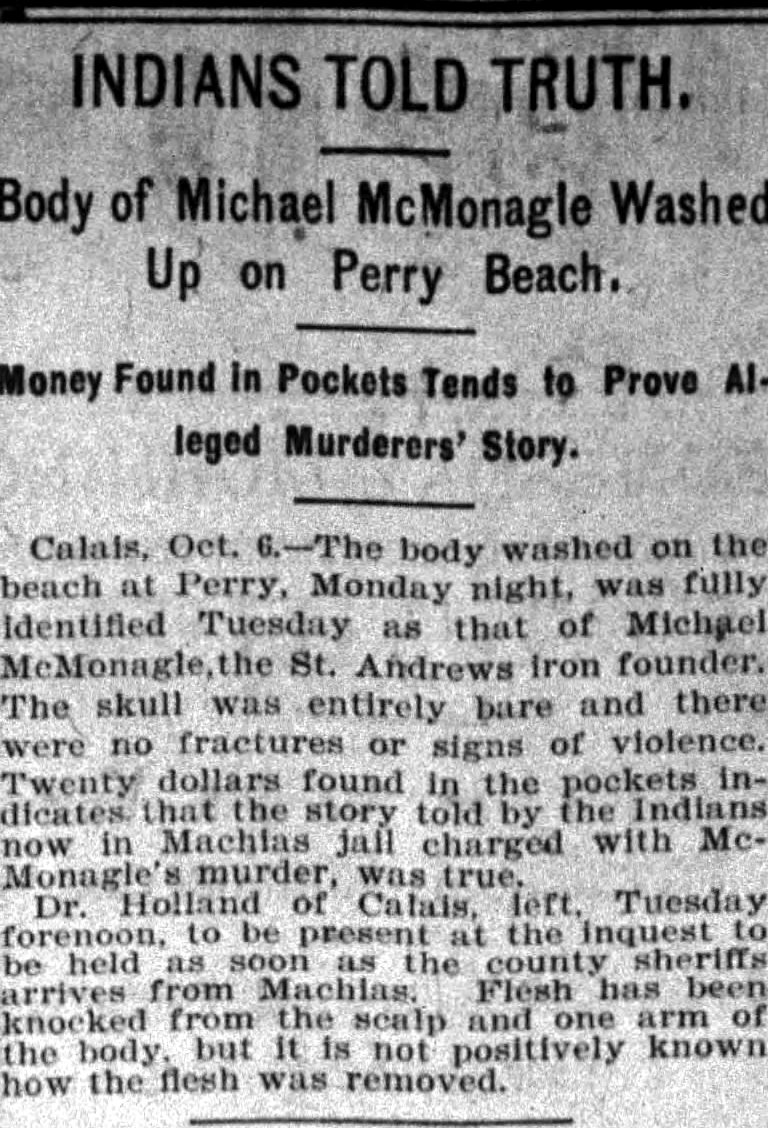
The body proved the Defendants version of events was true
The odd, unusual and curious from 1896:
The Fitchburg Massachusetts Sentinel and other national newspapers reported Calais experienced a “severe earthquake shock” on March 22, 1896. The Vermont Watchman said “houses trembled, dishes and windows were rattled, and the people rushed from their houses into the street in alarm, the shock passed from West to East and lasted about 5 seconds.”
The Fall River Massachusetts Daily reported that Calais in a population of 7,200 had 385 widows. We’re not sure of the significance of the widow count.
The Fitchburg Sentinel reported:
A Calais man, who has been drinking a glass of cold water before each meal for three months, because his physician said it would make him thin met a thin man the other morning who had been trying the same plan six months on the advice of another physician, who told him it would make him fat.
Many national papers reported that the Willian Todd, a schooner owned by the Todd lumber barons of Calais was fired upon near Kingston Jamaica by Spanish gunboats, boarded and searched for contraband. Tensions in the West Indies between the United States and Spain were high and continued to increase. Two years later the U.S. was at war with Spain.
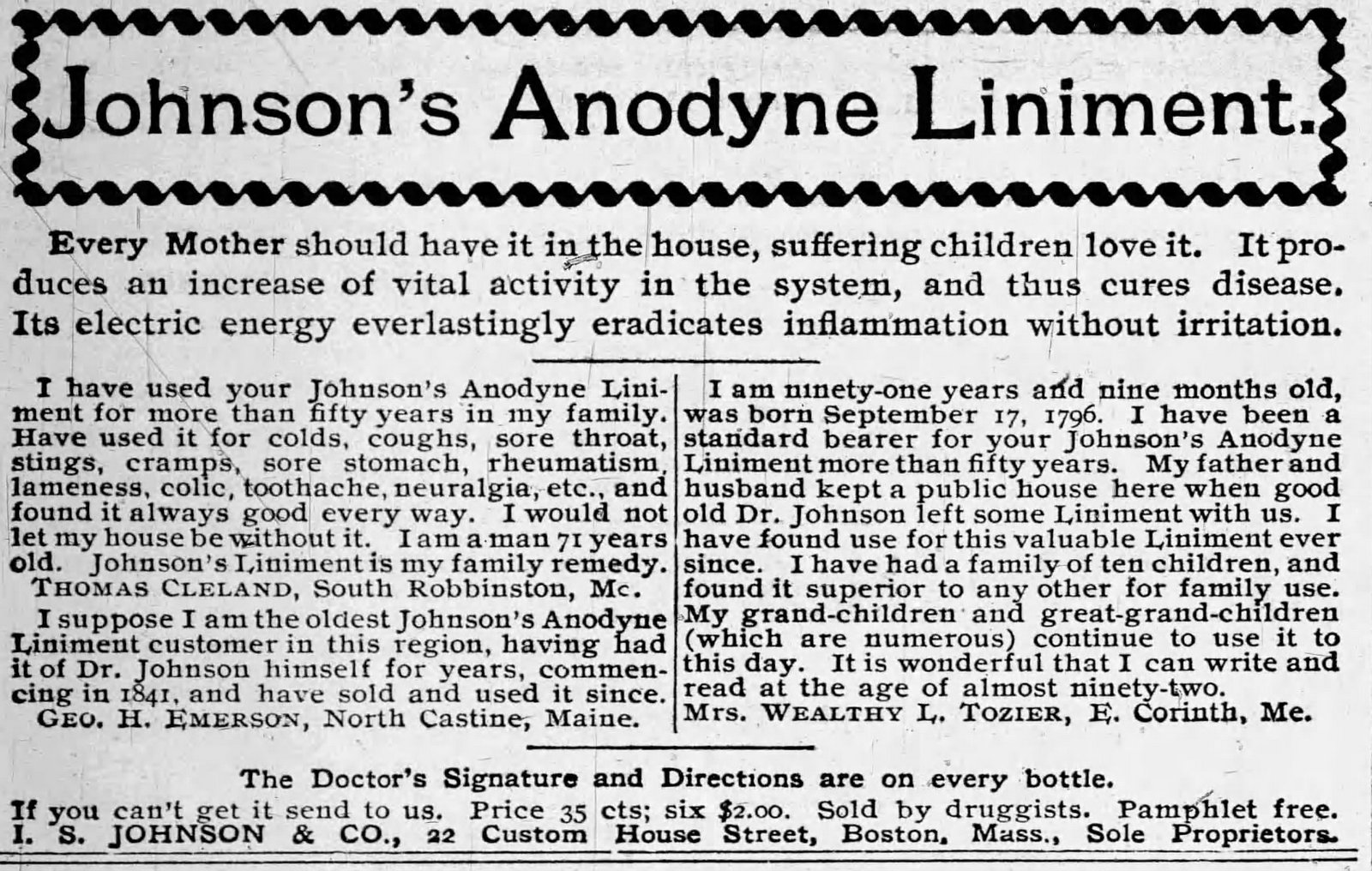
1896 ad carried in newspapers nationwide
Finally, hundreds of national papers carried this ad for Johnson’s Anodyne Liniment which Tom Cleland of Robbinston says cures about anything. According to Melva Morrell, Tom lived in the house now owned by the Brennans in the village although at the time of the ad he was said to be living in South Robbinston. Tom Cleland was a leading citizen of the town and a seemingly unlikely candidate to be a shill for patent medicine. Nonetheless we have come across dozens of such ads from local people swearing to the wonderous qualities of patent medicines and to be fair most of them did make the patient feel much better as they were often 80 proof and contained morphine, cocaine and/or opium. Perhaps Tom received a lifetime supply of Johnson’s Anodyne Liniment which by the way had two main ingredients-morphine and alcohol. Even though a liniment, the application taken internally.
Our favorite 1896 photo shows the Hurdy Gurdy man and his monkey working the crowd at the corner of Main and Church streets in Calais.
